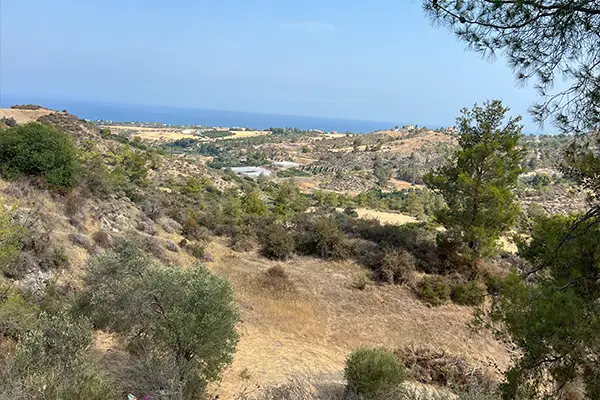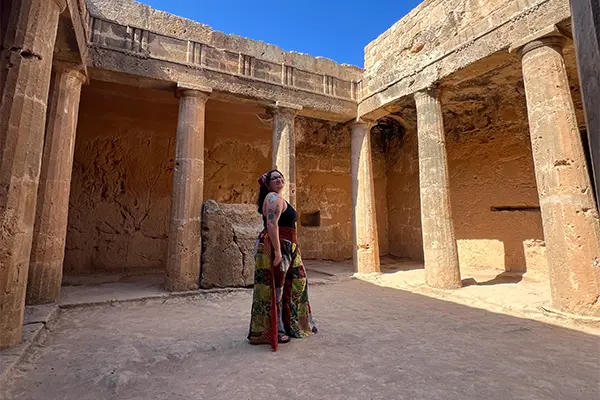Undergraduate Research Award Funds Study on Cyprus
Over the summer break UT student Gabby Puckett helped to excavate a prehistoric settlement in the Mediterranean and researched techniques to improve zooarchaeology.

Gabby Puckett has been interested in history and science since childhood and knew she wanted to study some type of anthropology in college. At the University of Tennessee, Knoxville, she found her passion for zooarchaeology and became part of an international research project the summer before her junior year.
Puckett received a UT Advanced Undergraduate Research Activity (AURA) Award in 2025. The funding allowed her to join the Makounta-Voules Archaeological Project, exploring a prehistoric site on the island of Cyprus and conducting her own research.
As a high school student, a tour of UT convinced Puckett she wanted to be a Volunteer, and soon after she met Associate Professor Erin Darby in the Department of Religious Studies.
“Dr. Darby has been an incredible mentor,” Puckett said. “She has really helped me figure out where in the world I want to study and connected me to all sorts of opportunities in the field.”
Interest to Anthropology Career
The College of Arts and Sciences allowed her to explore interests and develop a professional pathway, pursuing a double major in anthropology and religious studies, with minors in classical civilizations and Jewish studies.
“The big goal is to become a zooarchaeologist and stay in academia,” she said.
Puckett discovered the career opportunities during her first year at the college, attending a panel held by UT’s Undergraduate Anthropology Association. She met Assistant Professor Anneke Janzen from the Department of Anthropology, director of the university’s Zooarchaeology Laboratory and Vertebrate Osteology Collection.
“Hearing Dr. Janzen talk was like a puzzle piece clicked into place, and I knew that I wanted to spend the rest of my life researching zooarchaeology,” Puckett said. “I am largely focused on the Near East and changes in animal management strategies over time.” She’s also intrigued by the influence religion has on how people live.
Darby helped Puckett find funding opportunities for undergraduate research, including the AURA Award for which she applied. “My professors were incredibly helpful in reading things over and providing feedback,” she said.
While Darby didn’t travel to Cyprus, she continued to advise Puckett as the undergraduate focused her research.
International Experience
Puckett spent five weeks on the island of Cyprus with the Makounta-Voules Archaeological Project. “I had the most amazing experience in the world,” she said. “I’ve never been a morning person, but I will wake up at 4 a.m. every day for the rest of my life if it means I get to experience this again.”
“The motivation for this trip was to get some archaeological experience in the region of the world I hope to work in, but it has done so much more for me than I could have imagined,” she said.
Field work began at 5 a.m. every Sunday to Thursday. “On Fridays we would go to other archaeological sites all over the island, from Chalcolithic cemeteries to medieval castles,” Puckett said. “Some of my favorites have been visiting an Asklepion (ancient healing temple) and the Tombs of the Kings on my birthday, the amazing site of Prastio Mesorotsos (an archaeological site spanning multiple periods), and finally the beautiful painted churches of the Troodos.”
“I have also been given the opportunity to do some of my own research and am happy to say I’ve had some amazing results,” she said. Puckett focused on finding a solution to the problem that the calcium rich soil of Cyprus poses. “Calcium accretions attach to the bones, covering the surface and obstructing the identification of possible butchery marks or working marks,” she explained. “I used different mechanical and chemical methods to attempt removing the accretions.”
“I have never been more certain that this isn’t a once-in-a-lifetime trip; it is simply the beginning of the rest of my life,” she said. “I could never imagine myself being fulfilled in any other career.”
Ready for Work
Puckett also recognizes that while she developed skills specific to archaeology, such as digging techniques, she also gained abilities that can apply to any career she may pursue in the future.
“We worked as teams of three to five, and through that we all developed some amazing communication and teamwork skills,” she said. “Without being able to ask for help freely or depend on your trench mates it would be almost impossible to get anywhere on a project. I also became incredibly well versed at problem solving and flexibility in general through my independent research project.”
During her first year at UT Puckett served an internship at the McClung Museum of Natural History and Culture, and she is vice chair of the Student Advisory Board. “I will be back working in the fall as a visitors services associate, as well as helping Dr. Alison Damick in the Laboratory of Environmental Archaeology,” Puckett said.
During her sophomore year she presented at the 13th Annual Tennessee Undergraduate Classics Research Conference, hosted by UT’s Department of Classics. Now she’s preparing to present research from her project in Cyprus at the university’s Exhibition of Undergraduate Research and Creative Achievement (EURēCA).
With the Volunteer spirit and hands-on experiences that take college classroom learning into the world, Puckett is preparing not only for graduate school but to stand out wherever her career pathway leads.
By Amy Beth Miller

